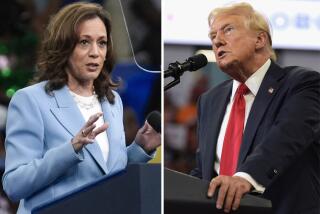They’re planning a stack of debates
- Share via
BATON ROUGE, LA. — A presidential campaign that has made historic strides in the areas of race, gender and fundraising could be poised to rewrite the book on debates.
With the bruising Democratic contest over, presumptive Republican nominee John McCain said Wednesday that he had proposed a series of town hall meetings with Barack Obama to be held across the country.
The first would be at New York’s Federal Hall a week from today.
“I don’t think we need any big media-run productions, no process questions from reporters, no spin rooms. Just two Americans running for the highest office in the greatest nation on Earth responding to the concerns of the people whose trust we must earn,” McCain said during a town hall meeting here.
“Oh, we’re definitely going to be doing some town hall debates,” Obama said Wednesday on ABC’s “World News.” And while the face-offs will not start as soon as McCain suggested, the presumed Democratic nominee said, “I look forward to . . . having more than just the three traditional debates that we’ve seen in recent presidential contests.”
In his letter to the Obama campaign, McCain suggested 10 town hall meetings, one per week, to be held before the Democratic National Convention at the end of August.
They would be 60 to 90 minutes apiece and have blind questions, an independent moderator and a live audience of 200 to 400 voters selected by a polling organization such as Gallup.
The timetable would make the debates the first between major-party candidates to occur before Labor Day weekend -- the traditional start of the fall campaign season.
They also would be the first between candidates who have yet to formally receive their parties’ nominations.
Earlier, more frequent debates could help carry the high voter interest levels seen during the primary season into the summer, while providing a chance to hear the candidates delve deeply into specific issues, said Kathleen Hall Jamieson, director of the Annenberg Public Policy Center at the University of Pennsylvania.
“The current structure [of campaigning] rewards candidates for being able to synthesize and digest. It doesn’t reward candidates for speaking about complex issues in a nuanced fashion,” Jamieson said.
The sessions could prove to be revolutionary innovations in campaigning, she said.
“The last time we had a real innovation in candidate-controlled discourse was when Ross Perot took the risk of giving a half-hour speech in 1992,” she said, referring to the independent presidential candidate’s purchase of television airtime to deliver what were in effect lectures on the national budget and tax policy. “He attracted a large audience and educated the public about the deficit, and he put it on the agenda.”
McCain previously floated the town hall idea to reporters on his campaign bus, crediting 1964 GOP hopeful Barry Goldwater and President Kennedy. The two men had agreed to make appearances together before the election, Goldwater said, but Kennedy was assassinated in November 1963.
Obama campaign manager David Plouffe said Wednesday that the debate proposal would be one of many items to be addressed in the coming days.
“As Barack Obama has said before, the idea of joint town halls is appealing and one that would allow a great conversation to take place about the need to change the direction of this country,” Plouffe said. “We would recommend a format that is less structured and lengthier than the McCain campaign suggests, one that more closely resembles the historic debates between Abraham Lincoln and Stephen Douglas.”
In the 1858 debates -- held during Lincoln’s losing Illinois Senate campaign against Douglas -- one candidate spoke for an hour, the other for 90 minutes, and then the first candidate had a 30-minute rebuttal.
--
More to Read
Get the L.A. Times Politics newsletter
Deeply reported insights into legislation, politics and policy from Sacramento, Washington and beyond. In your inbox twice per week.
You may occasionally receive promotional content from the Los Angeles Times.











